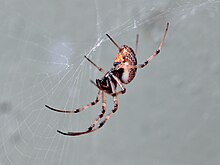Nephilengys papuana
| Nephilengys papuana | |
|---|---|

| |
| N. papuana from northern Australia | |
| Scientific classification | |
| Domain: | Eukaryota |
| Kingdom: | Animalia |
| Phylum: | Arthropoda |
| Subphylum: | Chelicerata |
| Class: | Arachnida |
| Order: | Araneae |
| Infraorder: | Araneomorphae |
| Family: | Nephilidae |
| Genus: | Nephilengys |
| Species: | N. papuana
|
| Binomial name | |
| Nephilengys papuana | |

| |
| Synonyms[1] | |
| |
Nephilengys papuana is a species of nephilid spider.[1]
Description[edit]
The species was previously included in Nephilengys malabarensis as the subspecies N. m. papuana, but is now recognized as a separate species.[1][2]
Female body length is about 28 mm, male length 6 mm.[3]
Male spiders apparently self-emasculate after copulation.
"At least in Nephilengys, this strategy enables remote copulation, a continuation of sperm transfer after males are detached from copula, which is an additional mechanism to secure eunuch paternity (Li et al. 2012). Although Nephilengys papuana eunuchs have not been subject to experimental testing, early research reported incidents of post-mating emasculation in this species (Robinson and Robinson 1980) and thus its behavior is likely to closely resemble that of its sister species."[4]
Name[edit]
The species name is derived from Papua.
Distribution[edit]
The species occurs in New Guinea and tropical Australia (Queensland).[2][5]
Gallery[edit]
-
Nephilengys papuana female (centre) and much smaller male (right) taken in Cairns
-
side view of female, Cairns
-
ventral view of female, Cairns
-
enlarged view of male, Cairns
-
N. papuana with egg sac and spiderlings
References[edit]
- ^ a b c d "Taxon details Nephilengys papuana Thorell, 1881". World Spider Catalog. Natural History Museum Bern. Retrieved 2017-05-16.
- ^ a b Matjaž Kuntner (2007). "A monograph of Nephilengys, the pantropical 'hermit spiders' (Araneae, Nephilidae, Nephilinae)". Systematic Entomology. 32 (1): 95–135. doi:10.1111/j.1365-3113.2006.00348.x. S2CID 84146620.
- ^ Whyte, Robert; Anderson, Greg (2017). A Field Guide to Spiders of Australia. Clayton South Vic. 3169: CSIRO publishing. p. 108. ISBN 9780643107076.
{{cite book}}: CS1 maint: location (link) - ^ Kuntner, Matjaž, et al. "Eunuch supremacy: evolution of post-mating spider emasculation." Behavioral Ecology and Sociobiology 69.1 (2015): 117-126.
- ^ "Australian Biological Resources Study". Australian Faunal Directory. Australian Government. 2009-08-31. Retrieved 2021-03-11.





